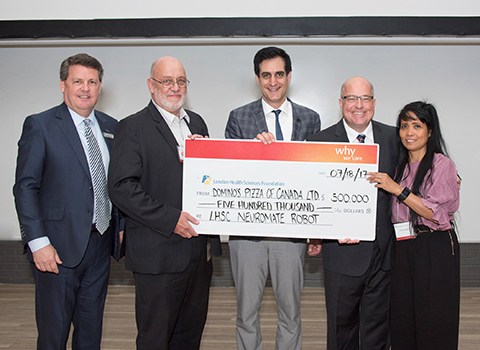
A half-million dollars in funding from Domino’s Pizza of Canada Ltd. CEO Michael Schlater and his wife Lilibeth has enabled London Health Sciences Centre to acquire leading-edge technology for the hospital’s Clinical Neurological Sciences (CNS) Program.
The Renishaw NeuromateTM surgical robot was used to perform a robotic-assisted stereoelectroencephalography (SEEG) procedure this past April, in which electrodes are placed into the brain to map epileptic seizure activity for patients whose complex epilepsy may not respond to medication or traditional treatment. In a hospital news release last month, the surgery was announced as a provincial-first. Several patients have received the life-changing, robotic-assisted surgery at LHSC since April.
Dr. David Steven, neurosurgeon and co-director of the epilepsy program at LHSC notes that the technology offers tremendous advantages.
“Use of the robot speeds the total procedure time and allows us to plan trajectories previously impossible, both of which make surgery safer and more accurate,” says Dr. Steven.
London Health Sciences Centre President and CEO Murray Glendining says that such advances are part of an ongoing effort to fundamentally transform the way care is provided.
“Donors like Michael and Lilibeth make such a tremendous difference in the care of patients and families who rely on LHSC," says Glendining.
London Health Sciences Foundation President and CEO John MacFarlane says that this is not the first time that the Schlaters have contributed to the hospital. Their total giving to LHSF has now exceeded $1 million.
“Mike and Lilibeth generously support so many good causes across Canada - and in Southwestern Ontario in particular,” says MacFarlane. “We are humbly pleased that they continue to advance health care by supporting medical excellence at LHSC.”
Originally from the USA and now settled in Leamington, Michael Schlater has been treated for epilepsy and so has one of the couple’s daughters. Being familiar with the challenges of the condition, the Schlaters have given tremendously to support work in the field of epilepsy, and especially paediatric epilepsy in Canada.
“Lilibeth and I consider it a privilege to be able to support Dr. Steven’s initiatives in delivering world-class medical services to his patients,” says Michael Schlater. “We hope this surgical robot will enable the hospital to remain at the forefront in treating neurological disorders.”
Glendining announced that the Schlaters’ cumulative contributions to LHSC have been recognized with a plaque in the EEG Waiting room at University Hospital.
The gift is counted as part of LHSF’s ongoing $200 million fundraising campaign to support the current and future needs of LHSC. At the launch of the campaign’s public phase last December, the foundation had $23 million left to reach its goal. With the Schlaters’ contribution, the campaign has now reached $195 million and MacFarlane predicts that the foundation will exceed its original target by year’s end.
